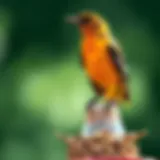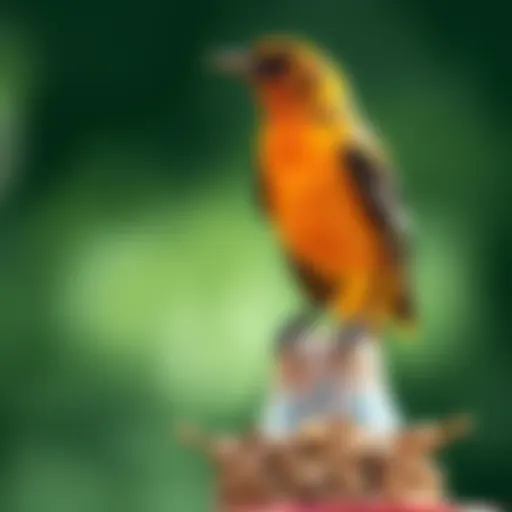Understanding the Lifespan of Pet Birds
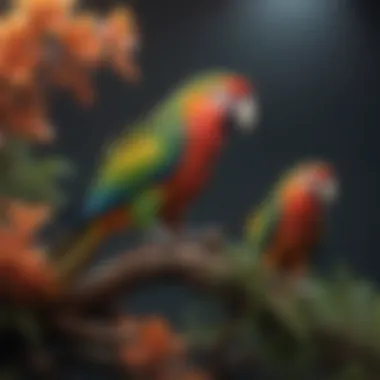

Intro
Keeping pet birds can be a rewarding experience, bringing joy not only to your home but also forming deep emotional connections. Their distinct personalities and vibrant colors capture the hearts of many, but the care they require should not be taken lightly. Understanding the various factors that influence their life spans—from species traits to everyday care—is key for anyone involved in bird ownership. In this journey through avian longevity, we aim to equip you with the knowledge necessary to nurture your winged companions.
Whether you’re a seasoned bird owner or contemplating your first feathery friend, grasping the fundamentals of proper care is essential. It's not just about keeping them alive; it's about ensuring they thrive. Let’s start with the basics of avian care.
Prologue to Bird Longevity
Understanding the life expectancy of pet birds is not just a matter of curiosity; it's a fundamental part of responsible bird ownership. The lifespan of these avian companions varies significantly among species, and having a broad grasp of this subject can help pet owners prepare for the journey ahead. Accurate knowledge empowers owners to provide tailored care, aiming for not only survival but a thriving, rich existence.
Understanding Lifespan in Avian Species
When we talk about lifespan in birds, we enter a multifaceted area that combines biology, environment, and care. Different species can live anywhere from a few years to several decades. For instance, while a cockatiel might average 10 to 15 years, a macaw can easily live for 50 years or more. This variation hinges on several factors, including genetics, environmental conditions, and diet.
Understanding these variances is crucial. It allows prospective bird parents to choose a species that fits their life plans. For example, adopting a budgerigar might suit someone who prefers the company of a smaller, less demanding bird. However, those ready to invest the time and resources might find joy in nurturing a larger species with a longer lifespan._
"Birds, in many ways, are like fine wine; they require attention and the right conditions to flourish over time."
In addition, understanding the species’ natural habitat can shed light on their needs and potential challenges. Knowing where a bird originates from contributes to grasping what will help them thrive outside their native setting.
Importance of Longevity in Pet Birds
Lifespan is not merely a number when it comes to pet birds; rather, it holds significant implications for both the bird and the owner. A longer life can prompt a richer bond between the bird and its human counterpart. As the days roll on, these relationships deepen—often transforming from mere pet ownership into a meaningful companionship that thrives on mutual understanding.
Furthermore, longevity in pet birds often correlates with their quality of life. A well-cared-for bird that experiences a stimulating environment, proper diet, and love might surpass the average lifespan for its species. Thus, pet owners need to focus on practices that promote health and happiness throughout the life stages of their feathered friends.
In essence, comprehending the elements influencing avian longevity positions pet owners to not only prepare for the years ahead but also enrich the life and companionship of their bird.
Keywords for SEO Optimization
- Bird lifespan
- Pet bird care
- Avian longevity
- Life expectancy of birds
- Companion birds
By weaving these keywords naturally throughout the content, we enhance visibility without compromising the informative quality, guiding pet owners and aspiring bird parents toward making informed decisions.
Species-Specific Longevity
Understanding the lifespan of pet birds is crucial for any bird owner, particularly for those looking to enrich their birds' lives. Different species come with specific longevity norms that shape expectations and care plans. Knowing these lifespans allows pet owners to provide tailored environments and care that best suit the unique needs of their avian friends.
Common Pet Bird Species and Their Lifespans
When it comes to pet birds, there's a colorful array of species, each bringing its own charm and personality. Here’s a look at a few common pet birds and their typical lifespans:
- Budgerigar (Budgie): These small, lively birds generally live around 5 to 10 years, with proper care sometimes pushing that closer to 15 years.
- Cockatiel: Known for their friendly demeanor, cockatiels often live between 10 to 15 years but can exceed that under optimal conditions.
- African Grey Parrot: Renowned for their intelligence, these birds are a long-term commitment, frequently living 20 to 30 years.
- Canary: While these charming singers typically live about 10 years, some canaries have been known to reach 15 years or even longer.
- Conures: These playful birds can have lifespans ranging from 20 to 30 years, depending on their species and level of care.
Establishing the lifespan of these species is essential to planning for their needs, from nutrition to environmental setups.
Comparing Lifespan Across Different Species
As we examine the lifespans of various birds, several factors come into play, making it critical to consider not only life expectancy but also what influences it.
- Size Matters: Generally, smaller birds tend to have shorter lifespans compared to larger species. For example, a budgie might live 10 years, while a macaw can live 50 years or more.
- Genetic Factors: Health challenges specific to certain breeds can affect longevity. For instance, some species are more prone to certain diseases, which can shorten their lifespan.
- Care and Environment: The quality of care significantly impacts how long birds live. Proper diet, mental stimulation, and suitable habitats can lead to longer, healthier lives.
- Natural Predators and Habits: In the wild, a bird's lifespan is often limited by threats like predators. Domesticated birds live without such threats but face their own set of challenges, primarily how well they adapt to living in a human environment.


The wide variation in lifespan among bird species stresses the importance of informed pet ownership. Pet owners should often ask themselves, "What is best for my feathered companion, considering its unique needs?"
"Each bird is an individual, and understanding longevity also involves knowing their specific habits and requirements."
Through recognizing these species-specific longevity aspects, pet owners can implement best practices to ensure their birds live not just long lives, but also fulfilling ones.
Factors Influencing Longevity
Understanding the various factors influencing the longevity of pet birds is crucial for any bird owner or aspiring parent. Different elements come into play, where awareness and consideration can significantly impact the quality and length of a bird's life.
As you consider adopting or caring for a pet bird, it's vital to see beyond just the enjoyment they bring. The lifespan of these companions is not merely determined by their species, but also by several external factors. Many pet owners might overlook aspects like genetics, diet, living conditions, and mental well-being, but these all play a significant role in ensuring your feathered friend thrives.
Genetics and Lifespan
Birds possess a variety of genetic backgrounds that predispose them to specific health issues and longevity. For instance, larger species tend to live longer than smaller ones, this aligns somewhat with the rule of thumb seen across various animal groups.
- Canaries, for example, may live up to 10 years but face a range of genetic conditions that can cut their lives short.
- On the other hand, African Grey Parrots can live for up to 60 years, thanks in part to their robust genetics and the attention they receive in captivity.
Genetics plays a fundamental role in determining not just lifespan, but the overall vitality of pet birds. Regular vet check-ups can ensure any hereditary issues are taken care of early on.
Role of Diet and Nutrition
The saying goes, "You are what you eat," and this rings particularly true when it comes to the diets of pet birds. A well-rounded diet is fundamental for maintaining health, enhancing longevity, and preventing disease.
- Seeds should not be the sole option; incorporating pelleted diets rich in vitamins can provide the necessary balance.
- Fresh fruits and vegetables should also adorn their menu; think leafy greens like spinach or treats like apples and carrots.
Key dietary considerations include:
- Avoiding sugary or salty human foods
- Ensuring access to fresh water at all times
- Offering a variety of foods to prevent picky eating habits
Birds thrive on variety, and the more colorful their plate, the better their chances are for a long life.
Environmental Considerations
Creating and maintaining a healthy environment for your pet bird cannot be overstated. The habitat they reside in has a direct influence on their stress levels and overall health. Proper ventilation and temperature control are key factors.
- Cages should be spacious enough for the bird to move around comfortably.
- Avoid placing cages in locations prone to drafts or extreme temperatures.
Furthermore, minimize exposure to hazards like smoke, strong odors, or toxic plants. All of these contribute to an atmosphere conducive to longevity.
Exercise and Mental Stimulation
Just like in humans, regular physical activity plays a pivotal role in a bird's lifespan. Exercise keeps their bodies fit, maintaining muscle health and preventing obesity.
- Flying space can significantly influence exercise levels, so it's ideal to allow them to roam in a secure area when outside the cage.
- Toys and puzzles can keep birds mentally engaged, which is equally important for preventing behavioral issues stemming from boredom.
Providing opportunities for flight, play, and exploration feeds their innate curiosity, fostering a well-rounded, healthy lifestyle.
"A stimulating environment and regular exercise are the bread and butter of a bird's well-being."
In summary, achieving longevity in pet birds isn't just about random luck but rather a holistic approach encompassing genetics, diet, environment, and stimulation. Being attuned to these countless influencing factors sets the stage for a long, enjoyable relationship with your avian friends, ensuring they live their best life under your care.
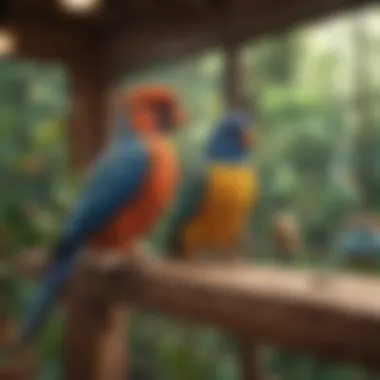

Common Health Issues Affecting Lifespan
Understanding common health issues is crucial for pet bird owners. The health of your avian friend can greatly influence their lifespan. Birds, like any other pets, can face health challenges that may not always be easily recognizable. Knowing what to look for can mean the difference between a long, vibrant life or an untimely passing. It's essential to appreciate the implications of these issues: they don’t just affect the bird's physical health, but their emotional well-being too.
Preventative Care and Health Monitoring
Prevention is always better than cure. Implementing a routine health monitoring system can catch issues before they escalate. Regular check-ups with an avian vet are pivotal. Keeping detailed logs of your bird’s behavior, dietary habits, and any changes can spotlight potential concerns.
- Routine Vet Visits: Schedule at least one check-up every year. This helps in early detection of diseases like psittacosis or avian flu.
- Daily Observation: Look out for subtle changes in your bird's behavior. A bird might be less active and that’s just as important.
- Diet Assessment: Ensure the diet remains balanced and adjust as needed based on the vet’s recommendations.
Using a checklist for daily health observations can help streamline the process.
A simple change in your bird's behavior could be a sign of distress, warranting immediate attention.
Chronic Illnesses in Pet Birds
Chronic illnesses stem from various factors including genetics and environment, impacting longevity significantly. Common chronic conditions in pet birds include:
- Obesity: Often caused by an unbalanced diet, obesity can lead to heart issues and joint problems.
- Respiratory Issues: Birds are sensitive to environmental conditions. Dust, pollutants, or poor air quality can trigger severe problems.
- Liver Disease: Diet is key here. Fatty liver disease can stem from overeating high-fat seeds.
Addressing these conditions calls for a proactive approach. Consequently, ensuring regular consultation with your vet can be a lifesaver, literally.
Signs of Aging and Associated Health Concerns
As birds age, like humans, they experience changes that can reveal underlying health issues. Recognizing these signs can help you provide the necessary attention. Some indicators of aging include:
- Feather Condition: Dull, falling feathers can signal nutritional deficiencies or illness.
- Changes in Vocalization: Is your parrot quieter than usual? This could indicate distress or illness.
- Reduced Activity Levels: If your active budgie now prefers to sit, it could be a sign of age or illness.
Regular check-ins with an avian vet can help mitigate these concerns. Writing down observations about changes in your bird can foster critical communication with your veterinarian. Catching these issues early often leads to better management and can extend life expectancy.
Ensuring your bird leads a wholesome life ultimately requires dedication, care, and vigilance on your part. By addressing health issues proactively, you're not only enhancing well-being but also increasing the chances of a long, happy life for your feathered companion.
Creating a Healthy Environment
Creating a healthy environment for pet birds is one of the most crucial aspects of ensuring their well-being and longevity. Birds, being sensitive creatures, require a living space that caters to their natural needs while providing safety and comfort. When bird owners put thought into setting up their birds' habitats, they significantly improve their feathered friends' quality of life. This goes beyond just having a cage; it involves understanding various elements that contribute to a thriving bird life.
Habitat Setup and Maintenance
First things first, the habitat setup plays a pivotal role in your bird's life. It’s not merely about where they live, but how it supports their natural behaviors. A spacious cage is essential—think of it as an apartment that should feel welcoming and cozy, not cramped and discouraging. The size of the cage largely depends on the species; larger birds like Macaws require more room than a Cockatiel.
When you set up the habitat, place a variety of perches made from different materials and shapes. Birds have a natural instinct to climb, so you should mimic their environment by including horizontal and vertical spaces. This variety encourages exercise and helps to keep their feet healthy, avoiding foot problems that can arise from improper perch types.
Maintenance is equally important. Regular cleaning is a must to avoid the build-up of bacteria or mold that could lead to health issues. Use bird-safe cleaning products and maintain an organized space, as clutter can lead to anxiety in birds. Feeders and water containers should be cleaned daily, ensuring that your pet has access to fresh food and clean water without cross-contamination.
- Clean surfaces and replace the bedding to avoid odors.
- Change foraging materials regularly to keep their environment stimulating.
- Inspect toys and accessories, removing any that show signs of excessive wear.
Socialization Needs of Pet Birds
Birds are inherently sociable creatures, and their socialization needs cannot be overlooked. Understanding how to engage your bird positively can make a world of difference in their mental and emotional health. Regular interaction with humans or other birds can prevent behavioral issues stemming from boredom or isolation.
Consider this: A bird left alone for extended periods may show signs of stress or behavioral changes, leading them towards destructive actions. They thrive on companionship, which helps oxygenate their surroundings and enhances their life experience. Make time for daily interactions; whether it's talking, playing, or simply being in the same room, these moments matter.
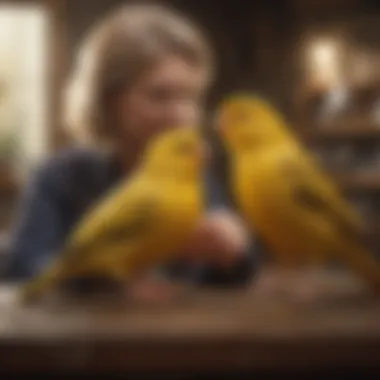

Incorporating toys that encourage social play is an excellent way to foster interaction. Look for items that they can tug, swing, or chew on, while also challenging them mentally. Some birds enjoy problem-solving puzzles, which can keep their intellect sharp.
- Engage your bird in familiar routines like the same playlist while you work or read.
- Enrich their environment with new toys and rotate them regularly to keep their interest alive.
"A bird's heart can sing freely only when the body and spirit are at peace—creating a healthy habitat and nurturing a social life allows this harmony to flourish."
In summary, establishing a healthy environment rooted in thoughtful habitat setup and actively meeting socialization needs is essential for the longevity of pet birds. These factors not only enhance their quality of life but also strengthen the bond between the bird and its owner, turning the experience of pet ownership into a fulfilling journey.
Emotional Bonds and Their Impact on Longevity
When it comes to pet birds, the bond they share with their human caregivers can play a significant role in their overall longevity. Birds are intelligent creatures that thrive on social interaction, and the emotional connection they develop with their owners can greatly influence their well-being. This section dives into how these emotional ties not only enrich the lives of our feathered friends but also contribute to their lifespan.
Understanding the Aviary-Human Relationship
The relationship between an aviary companion and its owner often mirrors that of a friendship. Birds have unique personalities, and they react to their surroundings and the people in their lives in fascinating ways. For instance, a parrot that receives daily social interaction, affection, and mental stimulation is likely to exhibit less anxiety and depression than one that feels isolated. A well-cared-for bird tends to be more active, playful, and open, leading to a happier and likely longer lifespan.
To foster this bond, it's crucial for owners to spend time interacting with their birds. Speaking to them, teaching them tricks, or simply allowing them to fly around in a safe environment can create a nurturing atmosphere. Positive reinforcement techniques can also help strengthen this relationship. Birds understand the essence of attention and will thrive when they feel loved.
Some key aspects to nurture this connection include:
- Communication: Regularly talking to your bird keeps them engaged and boosts their social skills.
- Playtime: Toys are not just for fun; they stimulate your bird’s mind, which can help reduce stress.
- Routine: Establishing a daily structure can provide a sense of security for your bird.
"A pet bird thrives on interaction; the more you nurture that bond, the stronger their will to live long and happy."
Stress and Its Effects on Health
Stress is an often-overlooked aspect of pet bird care, yet its impact on health cannot be emphasized enough. Birds are sensitive to their environment, and prolonged stress can lead to serious health issues. A bird that feels stressed may exhibit unusual behaviors such as feather plucking or aggression, which are signs of distress. When the bond between a bird and its owner is strong, the bird is typically more secure and experiences lower stress levels.
Common stressors for pet birds can include:
- Changes in Environment: Moving to a new home or changes in daily routine can unsettle a bird.
- Loud Noises: Sudden loud sounds can frighten them, increasing anxiety.
- Lack of Social Interaction: Birds that are left alone for extended periods may feel lonely.
To mitigate stress, owners should create a calming environment. This can be done by ensuring that the bird’s space is comfortable and free from loud disturbances. Also, periodic health check-ups can help in identifying any underlying conditions that might contribute to stress, thus protecting their longevity.
In sum, the relationship a bird has with its owner can have a profound effect on its emotional state and subsequent lifespan. By understanding the nuances of this bond and addressing the factors that promote well-being, we can help ensure our avian companions live long, fulfilling lives.
Culmination: Maximizing Pet Bird Lifespan
The journey of nurturing a pet bird transcends mere companionship; it is fundamentally about ensuring their well-being and longevity. An understanding of how to maximize a bird's lifespan is paramount for any avian enthusiast or pet owner. We can draw a strong connection between the way we care for our feathered friends and the quality of their lives. Every choice we make, from diet to social interactions, directly influences their health and happiness.
Implementing Best Practices for Care
To embark on the path that leads to a long, healthy life for your bird, adopting best practices in their care is key. Here’s how to go about it:
- Nutrition is Paramount: A balanced diet tailored to your bird's specific species is crucial. Providing a diverse range of seeds, pellets, fresh fruits, and vegetables keeps their diet exciting and nutritious. For example, cockatiels thrive on a mix of seeds supplemented with leafy greens, while budgerigars benefit from finely chopped fruits such as apples and bananas.
- Veterinary Checkups: Regular visits to an avian vet aren’t just a good idea—they're necessary. Just like us, birds can develop health issues that might not be immediately visible. Early detection of any problem could be the difference between a long life and a short one.
- Environmental Enrichment: Keeping birds in a stimulating environment is also critical. This might mean a larger cage than the bare minimum or providing toys for mental stimulation. Birds are social creatures; thus, they require contact with their human companions or other birds. Think of creative ideas that offer them the chance to socialize or explore new environments.
- Daily Exercise: Allowing your bird out of its cage for safe flight time can promote both physical health and mental well-being. Make sure that the area is bird-proofed, and monitor their free time to prevent accidents.
- Stress Reduction: Recognizing and mitigating stressors in your bird's life cannot be overlooked. Changes in the household, loud noises, or even the presence of unsuitable pets can lead to anxiety. Creating a calm environment can go a long way toward emotional health and longevity.
Implementing these best practices not only assures quality care but also fosters a deeper bond between bird and owner. Such connections are vital for the mutual understanding of needs and the emotional language that develops over time.
Final Thoughts on Bird Longevity
Birds, with their intricate social structures and emotional needs, require delicately balanced care. As much as they enrich our lives, they also depend on us to maintain their well-being. Ultimately, every bit of effort we put into understanding our birds pays off significantly.
In reflecting on the relationship between care practices and bird longevity, it’s evident that we have both a duty and an opportunity. Avian pets rely on us to provide not just shelter and food, but an environment and relationship where they can thrive.
In essence, enriching the life of your bird leads to a longer, happier existence, where the joy of companionship flourishes.
To summarize, maximizing the lifespan of pet birds is not just about longevity in years; it’s about the quality of those years. By implementing thoughtful strategies in care and being aware of their needs, both emotional and physical, we find ourselves on a rewarding path that enhances the lives of both birds and their owners.
The privilege of caring for a pet bird involves a commitment that can bring immense joy and satisfaction when approached with the knowledge and understanding required.










